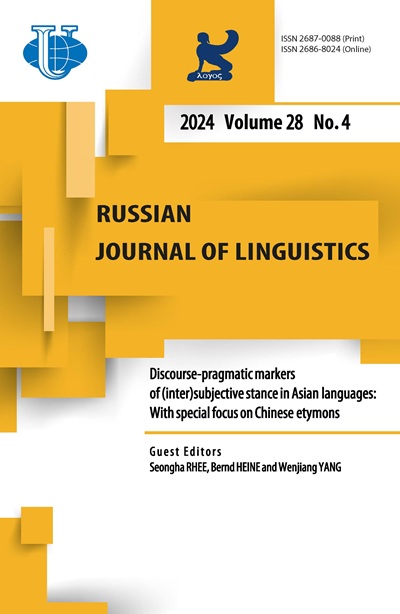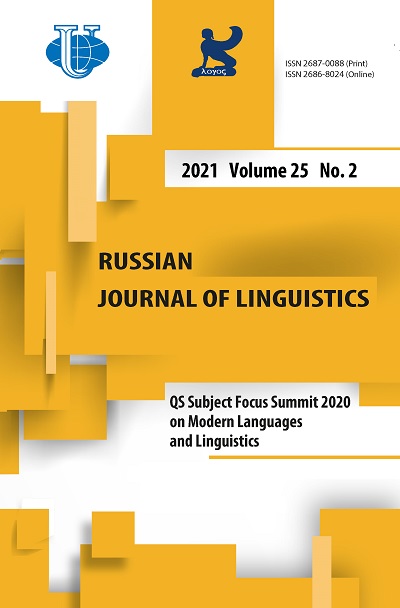Сравнение языков и культур: параметризация аналитических критериев
- Авторы: Левандовска-Томашчик Б.1
-
Учреждения:
- Государственная высшая профессиональная школа в Конине
- Выпуск: Том 25, № 2 (2021): QS саммит 2020 по предметным областям «Современные языки» и «Лингвистика»
- Страницы: 343-368
- Раздел: Статьи
- URL: https://journals.rudn.ru/linguistics/article/view/26796
- DOI: https://doi.org/10.22363/2687-0088-2021-25-2-343-368
Цитировать
Полный текст
Аннотация
Цель статьи - представить аргументы в пользу комплексного набора параметров кросс-лингвистического анализа значений, направленного на идентификацию релевантных аналитических критериев для осуществления такого сравнения. Аргументы опираются на данные словарей и корпусной лингвистики, а именно на полисемантичное понятие integrity (целостность) в английском языке и соответствующие ему понятия в польском. В когнитивной лингвистике, которая выступает как теоретическая основа данного исследования, традиционно считается, что значения, определяемые как концептуализации, основанные на конвенциях, не являются отдельными полностью устоявшимися сущностями даже в развернутых контекстах, а скорее представляют собой динамические конвенциональные концептуализации. Таким образом, важно идентифицировать их основные, прототипические смыслы , которые, помимо ядерной части, включают контекстуальные, культурно-специфические свойства и коннотации, определяемые в терминах параметрического набора как семасиологических, так и ономасиологических свойств. Методология исследования также адаптирована к многонаправленному анализу языковых форм и учитывает междисциплинарные - лингвистические, физиологические, культурные и социальные - факторы для идентификации культурных концептуализаций анализируемых форм. В данном случае будет представлен когнитивный корпусный анализ данных из словарей, из английских текстов, параллельных корпусов (английского и польского), а также их культурные параметры с целью вывести параметрическую систему когнитивных кросс-лингвистических основ сравнения - tertia comparationis - для более полного определения языковых значений.
Об авторах
Барбара Левандовска-Томашчик
Государственная высшая профессиональная школа в Конине
Автор, ответственный за переписку.
Email: barbara.lewandowska-tomaszczyk@konin.edu.pl
ORCID iD: 0000-0002-6836-3321
профессор в области лингвистики и английского языка на кафедре языка и коммуникации Государственного университета прикладных наук в Конине (Польша), ранее работала в Лодзинском университете. Ее исследования сосредоточены на на контрастивных исследованиях в области семантики и прагматики, корпусной лингвистике и переводоведении, лексикографии и анализе онлайн-дискурса. Выступает с докладами на международных конференциях, читает лекции и проводит семинары в университетах. Активно публикуется, руководит диссертациями, а также организует международные конференции и семинары.
1, Przyjazni str. 62 510 Konin, PolandСписок литературы
- Altenberg, Bengt & Sylviane Granger. 2002. Recent trends in cross-linguistic lexical studies. In Bengt Altenberg & Sylviane Granger (eds.), Lexis in Contrast. Corpus-Based Approaches, 3-48. Amsterdam: Benjamins
- Austin, John L. 1955. How to Do Things with Words. Oxford: Oxford University Press
- Barlow, Michael. 2008. Parallel texts and corpus-based contrastive analysis. In: Maria de los Ángeles Gómez González, J. Lachlan Mackenzie & Elsa M. González Álvarez. Current Trends in Contrastive Linguistics: Functional and cognitive perspectives [Studies in Functional and Structural Linguistics 60]. 101-121. Amsterdam: Benjamins
- Ba-awaidhan, Awad Gumaan. 2020. Cycles of conceptualization and reconceptualization in translating figurative language (with a special focus on selected Arabic-English proverbs). In Barbara Lewandowska-Tomaszczyk (ed.), Cultural onceptualizations in translation and language applications, 47-63. Cham: Springer Nature
- Dziwirek, Katarzyna & Barbara Lewandowska-Tomaszczyk. 2010. Complex Emotions and Grammatical Mismatches. Berlin: Mouton de Gryuter.
- Fauconnier, Gilles. 1994. Mental Spaces. Aspects of Meaning Construction in Natural Language. New York: Cambridge University Press.
- Fauconnier, Gilles & Mark Turner. 1998. Conceptual integration networks. Cognitive Science 22 (2). 133-187.
- Fillmore, Charles. 1985. Frames and the semantics of understanding. Quaderni di Semantica VI. 222-254.
- Frege, Gottleb. 1966 [1919]. Negation. In Peter Geach & Max Black (eds.), Translations from the Philosophical Writings of Gottlob Frege, 117-135. Oxford: Blackwell. First published in (1919) Beitrge zur Philosophie des deutschen Idealismus, vol. I. 143-157
- Geeraerts, Dirk. 2015. Quantitative corpus onomasiology. Conceptual Change - Digital Humanities Case Studies Lectures given on 7 Dec - 8 Dec 2015. KU Leuven
- Gladkova, Anna & Tatiana Larina. 2018а. Anna Wierzbicka, words and the world. Russian Journal of Linguistics 22 (3). 499-520. DOI: https://doi.org/10.22363/2312-9182-2018-22-3-499-520
- Gladkova, Anna & Tatiana Larina. 2018b. Anna Wierzbicka, Language, culture and communication. Russian Journal of Linguistics 22 (4). 717-748. DOI: https://doi.org/ 10.22363/2312-9182-2018-22-4-717-748
- Goddard, Cliff & Anna Wierzbicka. 2014. Words and Meanings: Lexical Semantics Across Domains, Languages, and Cultures. Oxford: Oxford University Press
- Goldberg, Adele. 1995. A Construction Grammar Approach to Argument Structure. Chicago: University of Chicago Press
- Goldberg, Adele E. 2003. Constructions: a new theoretical approach to language. Trends in Cognitive Sciences 7 (5). Amsterdam: Elsevier Science Publishing Company, Inc. 219-224
- Goldberg Adele E. 2006. Constructions at Work: The Nature of Generalization in Language. Oxford: Oxford University Press.
- Haiman, John. 1980. Iconicity of Grammar: Isomorphism and Motivation. Language 56/3. 515-540.
- Hauser, Marc D., Noam Chomsky &. W. Tecumseh Fitch. 2002. The faculty of language: What is it, who has it, and how did it evolve. Science 298. 1569-1579.
- Hofstede, Geert 1980. Culture’s Consequences: International Differences in Work-Related Values. Beverly Hills: Sage.
- Lakoff, George. 1987. Women, Fire and Dangerous Things: What Categories Reveal about Human Mind. Chicago: University of Chicago Press.
- Lakoff, George & Mark Johnson. 1980. Metaphors We Live By. Chicago: Chicago University Press.
- Langacker, Ronald W. 1987-1991. Foundations of Cognitive Grammar, vols. 1-2. Stanford: Stanford University Press.
- Langacker, Ronald W. 2008. Cognitive Grammar: A Basic Introduction. Oxford: Oxford University Press.
- Larina, Tatiana, Vladimir Ozyumenko & Svetlana Kurteš. 2020. Deconstructing the linguacultural underpinnings of tolerance: Anglo-Slavonic perspectives. Lodz Papers in Pragmatics 16 (2). 203-234
- Lewandowska-Tomaszczyk, Barbara. 1989. Praising and complimenting. In Wiesław Oleksy (ed.). Contrastive pragmatics, 73-100. Amsterdam: John Benjamins Publishing Co
- Lewandowska-Tomaszczyk, Barbara. 1996. Depth of Negation - A Cognitive-Semantic Study, Lodz: Lodz University Press
- Lewandowska-Tomaszczyk, Barbara. 2007. Polysemy, prototypes, and radial categories. In Dirk Geeraerts & Hubert Cuyckens (eds.), The Oxford handbook of Cognitive Linguistics, 139-169. Oxford: Oxford University Press
- Lewandowska-Tomaszczyk, Barbara. 2010. Re-conceptualization and the emergence of discourse meaning as a theory of translation. In Barbara Lewandowska-Tomaszczyk & Marcel Thelen (eds.), Meaning in translation, 105-148. Frankfurt: Peter Lang
- Lewandowska-Tomaszczyk, Barbara. 2012a. Explicit and tacit: An interplay of the quantitative and qualitative approaches to translation. In Michael Oakes, P. & Ji Men (eds.), Quantitative methods in corpus-based translation studies: A practical guide to descriptive translation research, 1-34. Amsterdam: John Benjamins Publishing
- Lewandowska-Tomaszczyk, Barbara. 2017. Cluster equivalence, general language, and language for specific purposes. In Marcin Grygiel (ed.), Cognitive approaches to specialist language, 384-418. Newcastle upon Tyne: Cambridge Scholars Publishing
- Lewandowska-Tomaszczyk, Barbara. 2020. Spaces of meaning and translators’ identities. Lublin Studies in Modern Languages and Literatures 44 (1). Maria Curie-Sklodowska University Press. 11-26
- Lewandowska-Tomaszczyk, Barbara & Paul A. Wilson. 2013. English fear and Polish strach in contrast: GRID approach and cognitive corpus linguistic methodology. In Johnny J. R Fontaine, Klaus R. Scherer & Cristina Soriano (eds.), Components of Emotional Meaning: A Sourcebook, 425-436. Oxford: Oxford University Press
- Nora, Pierre. 1992. Les Lieux de Memoire. Paris: Gallimard
- Palmer, Gary B. 1996. Toward a Theory of Cultural Linguistics. Austin: University of Texas Press
- Pęzik, Piotr. 2012. Wyszukiwarka PELCRA dla danych NKJP. In Adam Przepiórkowski, Mirosław Bańko, Rafał Górski & Barbara Lewandowska-Tomaszczyk (eds.), Narodowy Korpus Języka Polskiego, 253-279. Warsaw: Wydawnictwo Naukowe PWN
- Pezik, Piotr. 2014. Graph-based analysis of collocational profiles. In Vida Jesenšek & Peter Grzybek (eds.), Phraseologie im Wörterbuch und Korpus, 227-243. Praha: ZORA 97 Filozofska fakuteta
- Pęzik, Piotr. 2016. Exploring phraseological equivalence with Paralela. In E. Gruszczyńska & Agnieszka Leńko-Szymańska (eds.), Polish-Language Parallel Corpora, 67-81. Warsaw: Instytut Lingwistyki Stosowanej
- Przepiórkowski, Adam, Mirosław Bańko, Rafał Górski & Barbara Lewandowska-Tomaszczyk. 2012. Narodowy Korpus Jezyka Polskiego [National Corpus of Polish]. Warszawa: Wydawnictwo PWN
- Rosch, Eleonor. 1973. Natural categories. Cognitive Psychology 4. 328-350
- Sdobnikov, Vadim. 2019. Translation Studies Today: Old Problems and New Challenges. Russian Journal of Linguistics 23 (2). 295-327. DOI: https://doi.org/10.22363/2312-9182-2019-23-2-295-327
- Sharifian, Farzad. 2003. On cultural conceptualisations. Journal of Cognition and Culture (3) 3. 187-207
- Sharifian, Farzad. 2008. Distributed, emergent cultural cognition, conceptualisation, and language. In Roslyn M. Frank, René Dirven, Tom Ziemke & Enrique Bernárdez (eds.), Body, Language, and Mind (Vol. 2): Sociocultural Situatedness, 109-136. Berlin/New York: Mouton de Gruyter
- Sharifian, Farzad. 2017. Cultural Linguistics. Amsterdam: Benjamins
- Snell-Hornby, Mary. 2006. The Turns of Translation Studies. New Paradigms or Shifting Viewpoints? Amsterdam/Philadelphia: John Benjamins
- Stefanowitsch, Anatol & Stefan Th. Gries. 2003. Collostructions: Investigating the interaction between words and constructions. International Journal of Corpus Linguistics 8 (2). 209-243
- Stokes, Gordon & Daniel Whiteside. 1997. Tools of the Trade. Burbank: Community Builders Publishing LLC
- Sznycer, Daniel, Kosuke Takemura, Andrew W. Delton, Kosuke Sato, Theresa Robertson, Leda Cosmides & John Tooby. 2012. Cross-cultural differences and similarities in proneness to shame: An adaptionist and ecological approach. Evolutionary Psychology 10 (2). 352-370
- Talmy, Leonard. 1985. Force Dynamics in language and thought. Papers from the Regional Meetings, Chicago Linguistic Society 21. 293-337
- Tirado, Rafael Guzmán. 2019. Translation of words with a cultural component (Based on the Spanish translation of the novel by Eugene Vodolazkin “The Aviator”). Russian Journal of Linguistics 23 (2). 473-486. DOI: https://doi.org/10.22363/2312-9182-2019-23-2-473-486
- Tomasello, Michael. 1999. The Cultural Origins of Human Cognition. Cambridge, Mass.: Harvard University Press
- Trompenaars, Fons & Charles Hampden-Turner. 1997. Riding the Waves of Culture: Understanding Cultural Diversity in Business. 2nd edn. London & Santa Rosa: Nicholas Brealey Publishing Limited
- Vendler, Zeno. 1957. Verbs and Times. Philosophical Review 66. 143-160.
- von Wright, Georg H. 1963. Norm and Action. A Logical Inquiry. London: Routledge and KegaPaul.
- Wierzbicka, Anna. 1992. Semantics, Culture, and Cognition: Universal Human Concepts in Culture-specific Configarations. Oxford University Press.
- Wierzbicka, Anna. 1997. Understanding Cultures through Their Key Words: English, Russian, Polish, German, and Japanese. Oxford: Oxford University Press.
- Wittgenstein, Ludwig. 1953. Philosophical Investigations, translated by G.E.M. Anscombe. Oxford: Basil Blackwell.
- British National Corpus (BNC) http://www.natcorp.ox.ac.uk/
- National Corpus of Polish (nkjp.pl) Narodowy Korpus Języka Polskiego (NKJP) http://nkjp.uni.lodz.pl/
- PELCRA_CLARIN Tools http://pelcra.clarin-pl.eu/
- Paralela http://paralela.clarin-pl.eu/
- Sketch Engine https://www.sketchengine.eu

















